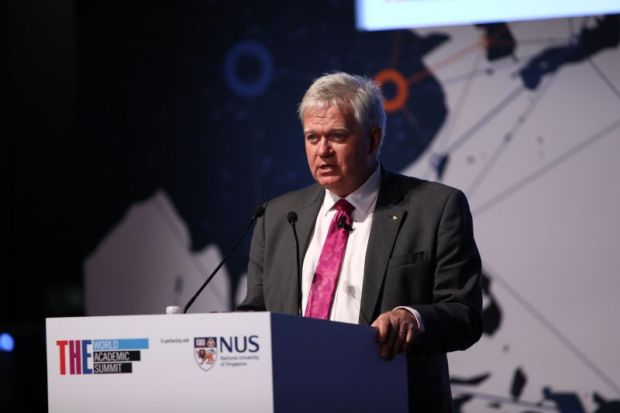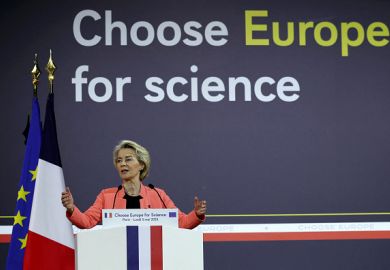Universities and media must join forces as rampant electioneering collides with insatiable demand for news amid disinformation on an unforeseen scale, according to outgoing Australian National University vice-chancellor Brian Schmidt.
Professor Schmidt said he expected “digital watermarking” to emerge within the next few years, allowing people to distinguish between authentic and fake. But in the meantime, “massive scale” generative artificial intelligence would enable the manipulation or synthesis of documents, videos, images and sounds that were “almost impossible to discern from reality”.
“Imagine a time when there is more fabricated digital content than real content; where no one can trust what is real and what is not,” Professor Schmidt told the National Press Club in Canberra. “That time, I think, is nearer than you might think.”
He said the world needed expertise like never before. “This might be a chance to break that 24-hour news cycle and replace it with a slower, more reflective type of reporting that embodies trust and truth. This is a place where, I hope, universities and media might work together.”
He said 40 countries with a combined population of 3.2 billion people faced elections in 2024. They included Australia’s giant neighbour Indonesia and his native US. “We should expect the beginnings of massive AI-generated misinformation campaigns to emerge in these elections,” he said. “To say I am worried about the US election is an understatement.
“[Donald Trump’s] last presidency ended with the most significant threat to the transfer of power in US history. The next US election is precisely 11 months away. That gives the world a small window to make change, or we may well face our media screens being filled with riots and the US Capitol being overrun once again.”
Professor Schmidt said that while universities were “not flawless”, they pursued truth without a political agenda or paymaster. “We follow the evidence and are transparent in our methods and outcomes. There has to be a space in a functioning democracy for experts to debate. Those places are called universities.”
He said that if he was able to make one change to how people were educated, it would be to “teach people from a very, very early age about uncertainty. You cannot understand the world unless you understand the shades of grey that come along with every single piece of information.”
But the culture of media, politicians and society “wants black and white answers”, he added.
Professor Schmidt said one challenge for universities was to “row against the tide of reluctance to have the hardest conversations. Some topics right now – let’s say the Israeli-Palestinian conflict – are so polarised, it is almost impossible to say anything that will not lead to some form of retribution involving harassment by the anonymously aggrieved.
“Students become adept at finding the space between our codes of conduct and the freedoms of expression we encourage on our campuses,” he said.
“Most of the intolerant behaviour is concentrated in a relatively small number of individuals, and people like this have always been at universities. The challenge is that the power of digital connectivity enables the anger of a small number of people to be aggressively amplified, with a chilling effect on free debate.”
Register to continue
Why register?
- Registration is free and only takes a moment
- Once registered, you can read 3 articles a month
- Sign up for our newsletter
Subscribe
Or subscribe for unlimited access to:
- Unlimited access to news, views, insights & reviews
- Digital editions
- Digital access to THE’s university and college rankings analysis
Already registered or a current subscriber?










